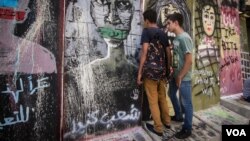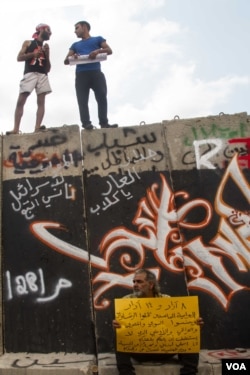The swift disappearance of a Beirut blast wall is being read by many Lebanese as a sign of uncertain times amid civil upheaval.
Erected Monday to block public access to Lebanon's most important political establishments, the concrete wall’s sudden arrival came after demonstrations that rocked the country and the well-established figures that run it.
But within a day of its construction, the wall was hauled away slab by slab, to the sound of protesters singing the national anthem.
Not being heard
‘It just symbolizes every method the [politicians] have used so far,” said activist Joey Ayoub. “The whole issue we are trying to raise is that we are angry and we feel our voices are not being heard, and then they go and put a wall in front of us."
Ayoub is a member of the organizing team behind You Stink, the movement that began because of uncollected trash but has grown to cause a major stir.
You Stink has given many Lebanese a voice with which to express anger, not just at the uncollected rubbish but with the political system that enabled it.
It is a system that many feel is nepotistic, corrupt and detached from the people.
“We’re the people who let these ministers inside [the parliamentary buildings], and now they don’t want to let us in,” said student Adham Rayda. “They are all in their own castle, their own comfort zone.”
It was You Stink that organized demonstrations on Saturday and Sunday that drew thousands. And it was on the road to the restored Ottoman-era government palace that houses the prime minister’s office and Cabinet, where some protesters tried to remove barbed wire amid clashes with the police, that the wall was built.
Caught off guard
The state security forces came in for heavy criticism for their handling of the protest. Scores of demonstrators and a number of police were hospitalized.
Amid growing expressions of anger at the establishment, many see the sudden arrival and disappearance of the wall as a sign of a government scrambling to keep up with events.
“[The government] was surprised at the intensity of the demonstrations — everyone was taken aback," said Sami Baroudi, a professor of politics at the Lebanese American University. “They underestimated the extent of popular protest."
“The political elite is nervous,” added Imad Salamey, a fellow politics professor at the university. “The movement is bringing in more of the mass population, and is anti-elitist and anti-sectarian in its nature.”
“This nervousness is not only because of its potential to develop, but also because the internal divisions between [politicians] are alarming,” said Salamey.
Lebanon's government is burdened by a conflict between rival candidates over who can become president — a post that has been vacant for more than a year and traditionally goes to a Christian. Meanwhile, the Cabinet remains deeply divided over political and sectarian lines, with deadlock often the result.
Salamey said the fate of the wall corresponds with the “chaotic” way events are developing within the country in the wake of You Stink’s ability to capture the public imagination.
“Things are not developing in a systematic manner,” he added.
A broad canvas
The wall drew unflattering comparisons.
"This wall reminds me of the Berlin Wall, dividing the democratic and the totalitarian,” said Mahmoud Kronbi, a father of two. He told VOA he had never been to a protest before, but felt that current events could “light a candle” of hope and change.
Meanwhile, etched in graffiti was a more local, and contemporary, comparison. "Here is Lebanon, not occupied Palestine," it read.
The words were among many daubed, painted and sprayed on the wall's dull gray surface.
One young Lebanese graffiti artist, who wished to be identified only by his tagging name of Exist, told VOA: “It was an obvious sign they’re scared of this connection between people, regardless of their political party."
“Writing on the wall is symbolic. It shows we don’t care if they put up more blocks, such as using politics, we will continue connecting with each other,” he added.
A view to power
By late Tuesday afternoon, and on the command of Prime Minister Tammam Salam, the wall and graffiti were gone.
The disappearance again gave protesters a view up to homes of political power — albeit one still blocked by barbed wire and police.
Meanwhile, in an emergency session, the government made a decision on the rubbish crisis that had sparked the You Stink movement: It decided to reject the winners of a tender to collect rubbish and start the process again.
For Ayoub, the Cabinet's decision and the decision to remove the wall were not entirely unalike, and will do little to calm sentiment ahead of a mass protest planned for Saturday.
“They proposed a so-called plan two days ago [to help rubbish collection], and they reject it," he said. "They built the wall and now they remove it.
“People will be just as angry as yesterday. It’s just another diversion.”





